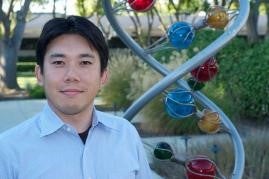Fundamental unsolved problem in genomics is the need for high-throughput approaches to bridge the gap between the availability of DNA sequence data and our ability to assign biological function to it. The DOE JGI’s niche is the development of a diversity of large-scale experimental and computational capabilities to link sequence to biological insights relevant to energy and environmental research. This will range from preparing material and applying functional capabilities prior to genomic analysis to post-sequence processing and manipulations to enable the Institute’s users to carry out sequence-to-function studies that are beyond the capabilities of individual laboratories. Here, I will discuss new sequence-to-function capabilities that have been established at the DOE JGI and some scientific examples enabled with these capabilities. These examples include development of genome engineering tools for engineering non-model bacteria and machine learning-guided engineering of non-model yeast chassis for fuel and chemical production.

Dr. Yasuo Yoshikuni is head of the DNA Synthesis Science Program at the U.S. Department of Energy Joint Genome Institute (JGI). The JGI started this program in 2012, as set forth in its 10-year strategic vision to serve community science as a user facility pioneering functional genomics to solve the most relevant bioenergy and environmental problems. The mission of this program is to harness the power of DNA synthesis, strain engineering, and biosystems design for DOE-mission-relevant discovery and applications. This program outputs ~7 Mbp/yr of DNA synthesis and ~4,000 constructs/yr and has supported over 200 projects since it started. In the JGI, Dr. Yoshikuni also manages the Synthetic Biology Pathway Engineering group. His research focus includes engineering of non-model yeasts for production of biofuels and renewable chemicals, developing genome engineering tools for non-model organisms, modulating microbe-microbe and plant-microbe interactions in various environments to improve crop yield, and developing a platform for building composite materials.
Before joining the DOE JGI, Dr. Yoshikuni was co-founder and chief science officer at a clean technology startup, Bio Architecture Lab, Inc. (BAL), where his significant achievement was using systems and synthetic biology to discover novel pathways assimilating unique sugar polymers in macroalgae and developing the first microbial platform technologies unlocking the potential of macroalgae as an environmentally sustainable and cost-effective biomass for production of renewable fuels and chemicals. The development of this technology allowed the company to build a strong IP proposition and to raise ~$40 million from venture capitalists, receive prestigious national grants (ARPA-E, CORFO), and build a commercial partnership with leading companies in the oil and chemical industries (e.g., Statoil, DuPont). The work also led to several patents and high-impact scientific publications in Nature and Science.
Because of his background in an industrial leadership position, Dr. Yasuo is extremely skilled at collaborating with scientists and engineers in multidisciplinary areas and addressing major scientific questions by organizing coherent teams.
Dr. Yoshikuni completed his graduate study at the University of California, Berkeley and a post-doctoral fellowship at the University of Washington.

